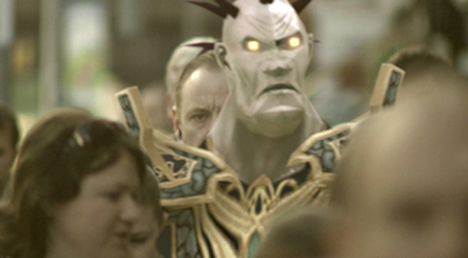Editor's note: Dennis wonders if Blizzard's failed plan to require real names on their forums would have actually benefited the community. Hey, real names certainly work well for us here at Bitmob. -Brett
![]()
All stills taken from the short film Avatar Days.
Two arguments rose against Blizzard's attempt to require the use of real names on the Battle.net forums. The first concerned stalking, and it was a little overblown. I have an admittedly cynical perspective on human nature, and even I don't think there would have been many gamers possessing the wherewithal to look people up in real life and harass them. But I can't fault anyone for erring on the side of caution.
The second concerned a desire to preserve gamers' ability to take on fictional personalities and escape from their daily lives. It's this latter point which I take issue with, because it's predicated on a false assumption.
In the real world, we have bosses, rules, and the daily grind of life. Unless we're born into wealth or okay with homelessness, we have no choice but to accept these limitations for the sake of friends, family, and living comfortable lives. In the virtual world, bosses can be fought. Rules can be broken. The grind is a matter of consensual choice. We inhabit a world which can, to a point, be bent to our wills. It functions as a cathartic release.
A friend of mine thinks it's "sad" that people feel the need to escape the "real" world with video games and other virtual environments. This from someone who enjoys poncing off on meditation retreats to sit under trees for hours, breathing deeply and thinking about nothing while chipmunks wander up to him and stare.
To me, that doesn't sound any less like a fantasy than logging into World of Warcraft. My friend's everyday reality does not involve sitting under a tree in the mountains. He lives in a large city surrounded by people and cars and smog and traffic and noise. What he's doing is making a value judgment that his escape is better than that of someone who prefers to escape online.
![]()
A person who plays WoW — we'll call him Seth the dishwasher — doesn't "become" Seth the Tauren Shaman when he logs in any more than my friend turns into someone else when he loses himself in the realm of meditation. Seth is still Seth. Most MMO players don't roleplay. They don't shift personalities when playing a video game.
Now, there may be different aspects of their personalities given primacy due to the freedom of action the game affords them — and unfortunately the anonymity of the Internet allows a tremendous amount of room for negative expression of character — but they're the same people (good or bad) they are outside of the game.
The desire for a sense of connection expressed by online play is not limited to massively multiplayer online games, of course. I'm part of a regular squad of friends who hit first-person shooters like they're training exercises. It's how we get to "see" one another because we're spread out all over the country. But those relationships are no less real than the ones I have with my local wargaming buddies.
![]()
During the Real ID debacle, no one really spoke about the possible benefits of this move. It's much easier to instead worry about sexual harassment and stalkers (not that these aren't real concerns) than to ponder the brave new world Blizzard proposed.
If people go into online worlds to engage with others and escape from the pressures of daily life, then wouldn't it benefit them to know that these avatars are real people, not just throwaway digital representations?
That's idealistic, perhaps, but I think the best part of a masquerade ball is when an identify is guessed and the mask comes off. I can't help but wonder whether the positive effects would have far outweighed the harmful ones if Blizzard stuck by their guns. Maybe other MMOs and FPS games would follow suit. No longer able to hide behind aliases, perhaps players both in games and on the forums would become a little more civil.
As long as aliases and online handles exist, it's too easy for people to forget that Seth the Tauren Shaman is not just a collection of pixels and textures they're stumbling across, but a real person.
Dennis Scimeca is the Editor in Chief of the website Game Kudos and a writer at Gamer Limit.. If you tweet him @DennisScimeca, he will get back to you after his next turn of Civ Revolution on his iPhone.


